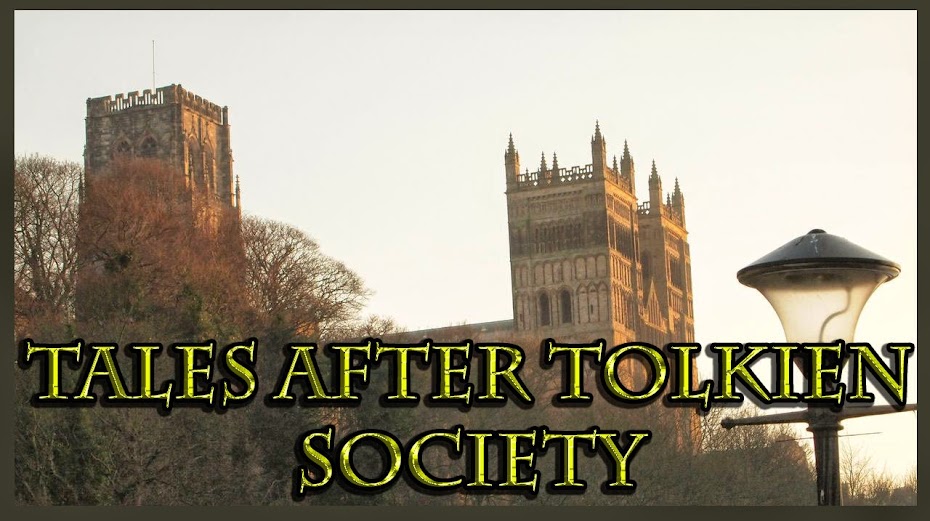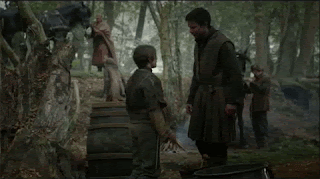Read the previous entry in this series here.
Read the next entry in this series here.
2.4 “Garden of Bones”
Read the next entry in this series here.
2.4 “Garden of Bones”
Written by Vanessa
Taylor
Directed by David
Petrarca
Commentary by Liam
Cunningham (Davos) and Carice Van Houten (Melisandre)
Oh, look, it’s another episode of Game of Thrones where death is the major theme, but this time it’s
not individual deaths or people doing things to cause their own deaths, but
massive deaths inflicted on the common folk at the hands of the nobles. The
title comes from Daenerys’ arrival at Qarth, where Jorah tells her that because
of the location of the city, if the masters of Qarth decide not to admit travelers,
they die outside the gates, where their bodies are just . . . left.
Daenerys and her khalasar
come very close to suffering this fate; the Thirteen (the council that governs
Qarth) ask to see her dragons before they’ll admit her, and Dany balks. The
reason for her refusal to show them the dragons isn’t clear—stubbornness? Not
like being told what to do? CGI budget too low?—but because of her refusal, the
Thirteen are prepared to allow Dany and her people to die in the desert. Only
the intervention of Xaro Xhoan Daxos prevents this fate; he swears a blood oath
(cutting across his palm, of course, because people in TV shows and movies don’t
need those tendons) to make Dany et
al his responsibility while they’re in the city. It looks like altruism, but
chances are it’s not. (Nobody on this show ever does anything just to be nice.)
So Daenerys and her khalasar live for
a bit longer, entering Qarth, the greatest city that ever was or ever shall be.
There’s some Lannister soldiers who aren’t so lucky. Robb
ambushes Stafford Lannister’s camp, leaving bodies strewn across the
battlefield. Roose mentions that they have too many prisoners and offers to
torture a few (specifically by flaying them) to get information rather than
feeding them. Robb tells him no, then dodges any further discussion by helping
a pretty battlefield nurse hold down a wounded soldier who really doesn’t want his foot taken off. Roose insists that there
are more important things to be doing than dealing with this one single
Lannister soldier, and he’s right, for the most part, but Robb has to make
goo-goo eyes at his new soon-to-be love interest (so much more on her later).
Yet spending some time with the soldier and Talisa allows the show to bash home
its message a bit; Talisa proceeds to chastise Robb (you know, just the king,
nobody important who could have her head off for sass-talking him) about
starting battles that cause no-name smallfolk to suffer. She does bring up a
good point that he doesn’t exactly have plans for what to do after he’s sacked
King’s Landing and killed Joffrey, then retreated north to be King in the North—who’s
he going to leave on the Iron Throne?
Meanwhile, Arya, Gendry, and Hot Pie are in the thick of the
expendable smallfolk, watching the Mountain’s torturer try to get information
about the Brotherhood and what valuables might be left in the village. One of
the women tells them that he picks one person every day and tortures them to
death. (My husband pointed out that this is really stupid—why tell them
anything if they’re just going to kill you anyway? Getting any information
through torture-to-death, especially in front of people you plan to torture to
death, is really inefficient.) Her time in the cage gives Arya an opportunity
to build and refine her “prayers”—the list of people who have hurt her or her
family and who she plans to kill one day. The torture goes on for several days,
until Tywin arrives and tells them torturing perfectly able-bodied people to
death—like Gendry, who’s in the chair when he shows up and tells Tywin he’s a
smith—is really extraordinarily stupid and they need to stop it at once. Arya
comes to Tywin’s attention because Polliver yells at her for not kneeling, and
Tywin decides Arya needs to be his next cupbearer. This accelerates Arya’s
timeline a bit, as the books have her working as a floor-scrubber for a while
before becoming Roose Bolton’s cupbearer when the Starks retake Harrenhal, and
completely shifts the power dynamic and implications for this relationship. I’ll
have more to say on it in the next couple of episodes.
Joffrey’s abuse of the smallfolk is more intimate in this
episode; in order to try to mellow him out (and get him to quit beating up on
Sansa), Tyrion gives him a nameday present of two whores—Ros and Daisy, both of
whom we’ve seen before. Joffrey doesn’t want to actually have sex with them
(his avoidance of Ros’ groping is interesting, and I’ll have to keep an eye on
his reaction to sexual situations from now on to see what the showrunners are
doing with this). Instead, he wants them to hit each other. A lot. Hard. With a
belt. And then with a stag-topped staff. At crossbow-point. Because he’s a
sociopathic, sadistic little shit. (Every single commentary track that deals
with Joffrey at all mentions what a nice kid Jack Gleeson is and what a shame
it is that he’s the most hated man on television.)
The specter of dead smallfolk is less visible when Renly and
Stannis have their parlay on the bluff overlooking the ocean, but it’s still
there if you know where to look. These two men (and Catelyn) are discussing how
to avert a battle between them, a battle that, like Robb’s attack on the
Lannisters, would kill lots and lots of people. This isn’t their main concern,
though, beyond the fact that killing lots and lots of people would mean their
armies would be weakened when it came time to attack King’s Landing. Mostly,
they’re worried about their pride. Stannis believes he’s the rightful heir to
the throne, all other considerations be damned. Renly believes he’s the better
choice for king because he’s more personable and has more support, because
Stannis never bothered to make any friends. Catelyn thinks they’re both being
idiots and need to kiss and make up. Of course neither of them can or will
bend, so the peace talks are a failure and they ride off to get ready for war.
Or, in Stannis’ case, to cheat. Hard. For a man who prides himself on honor and justice, he sure
doesn’t balk at using underhanded and magical means to get what he wants. He’s
got an “ends justify the means when it benefits me” kind of outlook that makes
him not nearly as honorable as he thinks he is. Of course, Ned Stark was as
honorable as Stannis thinks he is, and look where that got him. So Stannis has
Davos use his smuggling skills to sneak Melisandre ashore, where she once again
shows us her boobs, then births a shadow monster that runs off to make sure
there won’t be a fight between Renly and Stannis.
Bones once again play a part in the story when Petyr and a
couple of Silent Sisters bring Ned’s bones to Catelyn. Tyrion has arranged it
as a show of good will, hoping that Cat will agree to trade Jaime for Sansa and
Arya (completely lying about having Arya), since they know Robb won’t do it.
Petyr then makes a tactical mistake in trying to convince Catelyn that now that
Ned is dead, they can finally be together, still believing that it was Cat he had sex with all those years ago
(spoiler: it wasn’t. I don’t remember how much the show goes into this whole Cat-Lysa-Petyr
mess, so I’ll deal with it when and if it comes up).
Any storyline in A
Song of Ice and Fire that deals with the smallfolk (Arya’s and Brienne’s,
primarily) emphasizes how the lords playing their “game of thrones” do so on
the backs of the smallfolk, who for the most part couldn’t care less who’s in
charge as long as they can live in peace and feed their families. In A Clash of Kings, Arya overhears some of
the Harrenhal prisoners complaining: “It’s not just, it’s not. [. . .] We never
did no treason, the others came in and took what they wanted, same as this
bunch.” She then proceeds to curse the Tullys, Lannisters, and Starks equally (Clash 416). A lot of book-fans complain
about Brienne’s story in A Feast for
Crows, claiming that “nothing happens,” but what’s happening is Martin
establishing how much the War of the Five Kings has decimated the countryside,
uprooted families, and generally left chaos in its wake. So few medievalist
fantasy novels deal with the plight of the smallfolk at all that it’s really
refreshing to get it from Martin (even if he does exaggerate for effect).
On a side note, while Liam Cunningham and Carice van Houten’s
commentary didn’t add a lot to the analysis of this episode, it was a joy to
listen to, because they’re clearly such good friends and spend a lot of time
teasing each other. Also, Liam Cunningham’s accent is delightful.
RIP: Rennick
Lots of Lannister soldiers
Stafford Lannister, apparently (not on screen)
Next week: A girl must choose. A king dies. A man goes
north.
All images from screencapped.net
























